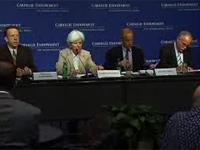Registration
You will receive an email confirming your registration.
On June 12, 2008, the Carnegie Endowment hosted a discussion on a policy brief by Marina Ottaway entitled Democracy Promotion in the Middle East: Restoring Credibility, with commentary from Jackson Diehl of the Washington Post and Hisham Melhem of Al Arabiya. Ottaway argued that after six years of the freedom agenda in the Middle East, there is little political progress to show for. Moreover, the large-scale attempts at democracy promotion have been disastrous in Palestine and Iraq. After promising too much and not consistently pursuing its goals, U.S. credibility on the issue is very low among both governments and opposition forces in the region.
In order to fix democracy promotion, the United States must first restore its own credibility by setting and sticking to modest goals and toning down its rhetoric. The United States must also tailor its policies to local conditions. For example, U.S. strategy in Egypt should emphasize opening up political party registration in Egypt versus in the United Arab Emirates, where it should focus on helping devise a modern political system.
Diehl concurred with Ottaway’s prescriptions, but pushed for more ambitious policies. Democracy promotion should be conducted more consistently, but not quietly. Efforts must also combine top-down pressure on governments with bottom-up pressure from civil society. Recognition that democracy promotion will conflict with the regime interests of U.S. allies in the region is necessary considering that modernizing political systems in the Middle East without democratization will provoke eventual crisis.
Melhem said that the new U.S. administration should be more forceful in promoting democracy. U.S. credibility has suffered from the deterioration in Iraq, which has emboldened autocratic regimes in the neighborhood, and inconsistent U.S. policy toward human rights abuses. In each Arab nation, the next administration should pursue a gradual approach that encourages reformers, including moderate Islamists, and clearly rejects human right violations.
During the question and answer session, the panelists touched on issues including differences between Islamist groups in the region, U.S. human rights violations, the legitimacy of U.S. democracy promotion, and political party registration in Egypt.
